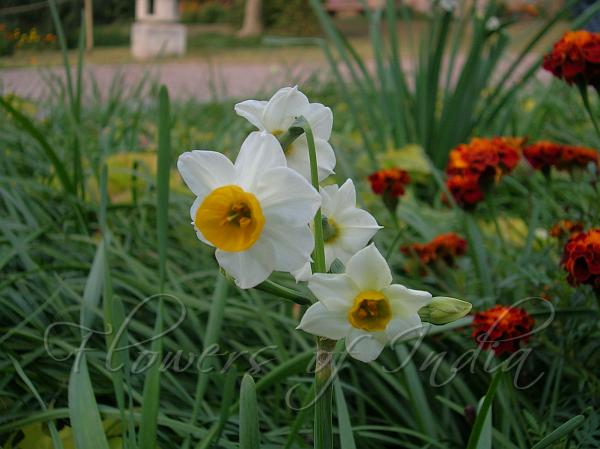|
| Nargis |
|

|

| File size | 974874 |
| Original date | 1/6/07 3:59 PM |
| Resolution | 2048 x 1536 |
| Flash | Flash did not fire, auto |
| Focal length | 8.0mm |
| Exposure time | 1/251s |
| Aperture | 3.2 |
| Focus Distance | |
| Metering Mode | Partial |
| Camera make | NIKON |
| Camera model | E3700 |
| Sensor type |
|
|
|
Photo: Thingnam Girija |
Botanical name: Narcissus tazetta Family: Amaryllidaceae (Nargis family)
Commonly known in India as Nargis, daffodils are lilylike perennials with numerous narrow, straplike leaves, and a single flowering stalk, all arising from a subterranean bulb. Leaves grow upward, then droop out and down, and range from 6-30 inch in length. Flower stalks range from 4 in tall in the miniature varieties, up to 24 in tall in standard varieties. There can be from one to a dozen or more flowers per stalk. Flower colors are mostly white and yellow, but some kinds have orange, pink or red coronas. There are about 50 species of daffodils, and many thousands of named cultivars and hybrids of garden origin. Daffodils originated in Portugal, Spain, the southern coast of France and the northern coast of Morocco. Medieval Arabs used juice of the wild daffodil, N. pseudonarcissus as a cure for baldness.
The name Narcissus has it origin in the famous Greek myth about Narcissus, the handsome youth who was granted his great good looks by the Gods. However, his beauty was permanent and he was immortal, "If he never knows himself". Many nymphs fell in love with him, but he did not respond. A nubile wood nymph named Echo fell desperately in love, but Narcissus spurned her. She was so devastated by his rejection that she wept and wailed, and was ultimately consumed by her love. But the Gods were not pleased. The goddess, Nemesis, heard about poor Echo, and lured Narcissus to a shimmering lake. There in his vain state, he was unable to resist gazing at his own reflection, and fell in love with himself! As he gazed, the divine penalty took effect, and he simply faded away. In his place sprang up the golden flower that bears his name today. Now you know how Nargis came to be, and also why psychologists warn vain patients about the "Narcissus complex."
| Identification credit: Tabish | Photographed in Garden of Five Senses, Delhi |